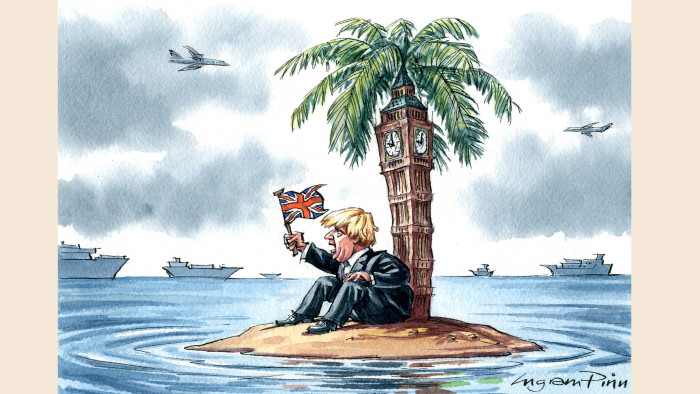Boris Johnson is wrong. Parliament has the ultimate authority

The neuralgic word in the British debate about Europe is sovereignty. Boris Johnson has joined those arguing that the authority of parliament can be restored only if Britain quits the EU. The nation can then take back control of its destiny.
This is a beguiling pitch but the London mayor has a shaky grasp of Britain’s unwritten constitution. In or out of the EU, Westminster has always been sovereign. The British parliament has been described as an elective dictatorship. The serious discussion is about how well it deploys its sovereignty.
Never over-impressed by inconvenient detail, Mr Johnson is not alone in his confusion. To win over wavering sceptics to the In camp, David Cameron has promised a new law putting beyond doubt the sovereignty of the legislature. The prime minister is in the realm of tautology here. How does a sovereign parliament make itself more sovereign by declaring itself, well, sovereign?
Britain has long been a prolific signer of treaties and an energetic joiner of international institutions. Dominic Grieve, a Conservative former attorney-general, once asked the Foreign Office how many such international documents bore the British seal or signature. The FCO went back as far as 1834 and counted 13,200, ranging from bilateral defence pacts and arrangements delineating, say, fishing rights to treaties marking UK accession to the UN and Nato.
Many of these will have fallen by the wayside but several thousand remain in operation. Each in its way chips away at notional sovereignty, whether by providing for binding third-party resolution of disputes or imposing voluntary restraints and reciprocal obligations. Torture is made illegal by Britain’s signature on the UN Convention against Torture. The courts enforce human rights on the basis of UK accession to the European Convention on Human Rights.
Yet even as authority is delegated, the sovereignty of parliament remains unfettered. What Westminister devolves it can reclaim. International treaties and commitments bind Britain only in so far and for so long as a majority of parliamentarians so decide. Each and every one could be abrogated by a simple legislative act. Britain is free to leave the UN, quit Nato and renounce its human rights commitments whenever it so chooses.
The same is true of the EU. Membership of the union represents the most extensive and complex exercise in the delegation of authority to a supranational organisation. The European Court of Justice adds a dynamic legislative interpretation mostly absent elsewhere. The basic principle remains, however: the accession treaty can be revoked at the whim of parliament.
Sir Nicholas Macpherson, the permanent secretary of the Treasury, made just this point when Whitehall mandarins gathered in Brussels recently to discuss the implications of Brexit. No problem, Sir Nicholas told colleagues, parliament could simply repeal the 1972 European Communities Act, which gave legal force to the EU accession treaty.
Nor is there any need for Westminster to wait for a referendum. Come to think of it, the self-declared champions of parliamentary sovereignty have rather undercut their case by demanding that a Brexit decision be settled by a referendum rather than parliament.
So much for the constitutional niceties. The important distinction is between sovereignty and power. International agreements mark a recognition that sovereignty and real-world capacity to pursue the national interest are divisible — that a seeming subtraction from the former can increase the latter.
Britain’s enthusiasm for such agreements is unsurprising. Its interests, economic and strategic, have for centuries been global. So are its vulnerabilities. Even in the heyday of empire, its politicians recognised that, while gunboats were sometimes jolly useful, Britain was often better served by international rules and treaties. That is why during the 1870s it agreed to submit territorial disputes with Washington to independent arbitration. The castaway alone on a desert island may be sovereign over all she or he surveys — and impotent.
What was true for an empire is all the more compelling for a significant European power seeking to navigate the age of 21st century global interdependence. The choice is not a binary one between sovereignty outside the EU and serfdom within but the hard-headed one about how to advance the prosperity and security of the nation. In the case of the EU what some consider a diminution of sovereignty is an addition to authority.
The prime responsibilities of government — safeguarding the security and liberty of the citizen and providing the framework for individuals to prosper — militate against the hoarding of sovereignty. The threats from nuclear proliferation, a revanchist Russia, Islamist terrorists, environmental degradation and international crime present one set of challenges; securing access to global trade, investment, and technological innovation another. None is susceptible to national unilateralism.
So to take back sovereignty can be to surrender control. Viscount Palmerston, the 19th century British prime minister, is often quoted for remarking that Britain did not have permanent allies but rather permanent interests. High on his list today would be the security of the European continent. These interests are best pursued, Palmerston might have added, through alliances.
Letter in response to this column:
Very fact that we can leave destroys argument / From Prof Christopher Grey
Comments